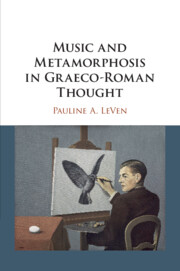Book contents
- Music and Metamorphosis in Graeco-Roman Thought
- Music and Metamorphosis in Graeco-Roman Thought
- Copyright page
- Dedication
- Contents
- Acknowledgments
- Abbreviations
- Introduction
- Chapter 1 Forest: On Surrounds
- Chapter 2 Ringdove: On the Uncanny Power of Performance
- Chapter 3 Cicadas: On the Voice
- Chapter 4 Echo: On Listening
- Chapter 5 Reeds: On Musical Objects
- Chapter 6 Nightingale: On Expression
- Chapter 7 Beetle: On Rhythm
- References
- Citations Index
- Subject Index
Chapter 3 - Cicadas: On the Voice
Published online by Cambridge University Press: 25 November 2020
- Music and Metamorphosis in Graeco-Roman Thought
- Music and Metamorphosis in Graeco-Roman Thought
- Copyright page
- Dedication
- Contents
- Acknowledgments
- Abbreviations
- Introduction
- Chapter 1 Forest: On Surrounds
- Chapter 2 Ringdove: On the Uncanny Power of Performance
- Chapter 3 Cicadas: On the Voice
- Chapter 4 Echo: On Listening
- Chapter 5 Reeds: On Musical Objects
- Chapter 6 Nightingale: On Expression
- Chapter 7 Beetle: On Rhythm
- References
- Citations Index
- Subject Index
Summary
Before we turn to the larger debates, a few words about the myth of the cicadas in its narrative context. The story is recounted at a turning point in the Phaedrus, as Socrates moves from the three speeches on love that have so far occupied him and his conversation partner, Phaedrus, to the examination of rhetoric and the value of writing that will engage them to the end of the dialogue. The reference to the cicadas is at first puzzling. It is not the first time, of course, that Socrates comments on their natural surroundings; earlier in the dialogue, he remarked on the countryside setting, which “echoes in a clear-sounding and summer-like way the chorus of cicadas” (θερινόν τε καὶ λιγυρὸν ὑπηχεῖ τῷ τῶν τεττίγων χορῷ, 230c). But it is striking that he turns his attention to the environment at this precise point in the text, and that he takes his cue from the insects and tells the myth of their origin when he had concluded from the earlier observation that “countryside and trees cannot teach [him] anything” (τὰ μὲν οὖν χωρία καὶ τὰ δένδρα οὐδέν … ἐθέλει διδάσκειν, 230d). How can this be accounted for? This oddity has brought one of the major commentators of the Phaedrus to consider the cicada myth a “relaxing intermezzo.” Others, however, have proposed to take “listening to the cicadas” as the leitmotif of the Phaedrus, or to interpret the myth in the light of the main questions explored in the dialogue: as a reflection on the nature of the soul, as a celebration of musical eros, as a form of psychagogia, as a reinterpretation of the Pan myth, or as a presentation of different types of response to sensible beauty. Most commentators in fact have analyzed the myth by reflecting on its function in the context of the dialogue, and explained it in light of the rest of the Phaedrus.
- Type
- Chapter
- Information
- Music and Metamorphosis in Graeco-Roman Thought , pp. 79 - 106Publisher: Cambridge University PressPrint publication year: 2020



